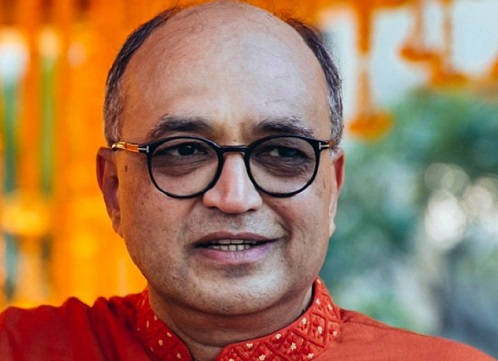
- Former Chairman & Managing Director, Darjeeling Organic Tea Estates Pvt. Ltd. (Tea, agribusiness)
“My general approach towards the workers and their family was that we were all part of one family. So I think that was a major act of breaking down the formal relationship of the previous [colonial] structure.”
Summary
In this interview, Sanjay Bansal, former chairman and managing director of Darjeeling Organic Tea Estates Pvt. Ltd., narrates the arc of his career—beginning with his birth on the Ambootia tea estate in 1961, through the rehabilitation of dozens of sick estates, to earning the status of one of the largest producers of organic and biodynamic Darjeeling tea in the world.
Bansal begins by sharing his intimate knowledge of the Darjeeling tea industry—both as it began under the British, and it has evolved since Indian independence in 1947. He explains the deeply-ingrained, heirarchical relationship between managers and employers, sheds light on traditional farming techniques, and also discusses some of the long-term, negative social legacies of British policies on workers and their families.
Although Bansal never intended to join the family business, he explains how his early years spent on the plantation—and the time he spent working for his father later on¬—perfectly positioned him not only to become a successful manager and dedicated leader, but also to work for the improvement of the lives of his workers. “Because of my local affinity,” he said, “that big gap between “demigods” and the subjects automatically had been dismantled.” Instead, Bansal stressed, “my approach towards the workers and their family was that we were all part of a family.” This philosophy has manifested itself in many ways across Ambootia. The group has opened free schools for the children of tea workers, the company began a 50/50 business model with workers’ spouses for the growing and harvesting of biodynamic spices, and—perhaps most importantly—the company seeks to give weight to the voices and opinions of the workers.
Bansal goes on to share how and why he made the transition from traditional farming to organic and biodynamic agriculture. He describes the nuances of the techniques, how they work to improve the health of the tea estate, and the many reasons—not just the production of a higher-priced commodity—that they ultimately yield increased profits. Using such techniques, Bansal has successfully revived more then a dozen ailing tea estates in Darjeeling and Assam, and in the interview he discusses how his own unique farming practices have influenced similar changes in the operation of other plantations in the region.
Darjeeling—because of its unique geography and climate conditions—produces a unique tea found nowhere else in the world. Maintaining the purity of Darjeeling tea, however, has been a major issue. Bansal explains how, until recently, many brands would sell “Darjeeling tea” that was actually just 50 percent tea from that region. In the interview, he narrates his years-long struggle to obtain international recognition for and protection of certified Darjeeling tea. He also describes how he worked to promote greater consciousness about organic farming in India.
Bansal concludes the interview by discussing the causes and consequences of the strike that paralyzed the Darjeeling region during the 2017 growing season.
Video Clips by Topic
Diversification
Ethnicity and Race
Sanjay Bansal, former head of Ambootia tea estates in Darjeeling, India, discusses the near-feudal conditions which prevailed in the tea industry in this region, and the acute social problems faced by the Nepalese-speaking labor force, which was predominately female. Having grown up on the estate, he had learned Nepali, and was able to communicate with the workers directly about his plans for renewal by switching to organic farming. Bansal ends by discussing the severe crisis in 2017, when there was a region-wide strike caused the state government’s decision to replace Nepalese with Bengali as the second language taught in schools.
Government and Business
Labor Relations
Sustainability
Additional Resources
- Sambit Saha, "Legal hurdle to tea garden hunt for investors," Telegraph India, August 22, 2022.
- Darjeeling: The Colorful History and Precarious Fate of the World's Greatest Tea, London: Bloomsbury Publishing, 2015.
- "Fund-starved Darjeeling tea companies face an existential crisis," Economic Times, March 7, 2018.
- "Like Darjeeling Tea? Meet One of the First Women Factory Managers in India’s Premier Tea Region," Pulitzer Center, December 22, 2017.
- Jane Pettigrew, "Ambootia Rescues Sick Tea Gardens," Stir—Global Business Insight on Coffee and Tea, June 8, 2016.
- Sutanuka Ghosal, "Organic for health & wealth: Sanjay Bansal," Economic Times of India, June 6, 2010.
- Shutapa Paul, "Bengal’s tea gardens begin to shed sick tag," Live Mint, November 19, 2009.
- "Foreign Investors to take management control of Darjeeling Organic Tea Estates," Telegraph India, November 10, 2020.
Interview Citation Format
Interview with Sanjay Bansal, interviewed by Geoffrey Jones, Kolkata, India, April 27, 2018, Creating Emerging Markets Project, Baker Library Historical Collections, Harvard Business School, http://www.hbs.edu/creating-emerging-markets/.
